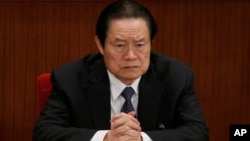China's investigation into one of the country's once most powerful politicians, former domestic security tsar Zhou Yongkang, is a crucial step, analysts say, but only the beginning of what is likely to be a more drawn out and increasingly tense battle against corruption. Analysts say one key challenge that Zhou’s investigation highlights is the need to do more to reform powerful state owned enterprises, which have long been a source of corruption.
Powerful dual role
Zhou Yongkang’s rise to power and influence began in the oilfields of northeast China. He played a part in developing some of the country’s biggest sources of oil and in the opening of gas fields in remote Xinjiang and southern Sichuan.
From his eventual post as head of state-owned China National Petroleum Corporation (CNPC), he rose up within the party to hold other key positions, including public security minister, before becoming a member of China’s top leadership body, the Politburo Standing Committee.
As his power and influence grew, there were others around him who also benefited from their experience in the state-run oil industry, and they stuck together.
David Zweig is a political scientist at Hong Kong University of Science and Technology. He said oil is a critical resource for the stability of the Communist Party. "It is [a] critical resource in terms of imports, goods being brought in from overseas a lot of capital a lot of cash going into it. These are powerful companies. They are among the most powerful companies in the world," he explained. "The Chinese oil companies give a lot of power and a lot of prestige to a small group of people who can really hang together.”
China corruption probe, reform
When Chinese President Xi Jinping and Premier Li Keqiang began their push to promote reforms after stepping into office, individuals such as Zhou were seen as a key obstacle to that effort, and so a push began to remove them.
According to the Chinese language financial news magazine Caixin, at least 45 people from CNPC are already under investigation, including several with close ties to Zhou.
It is not yet clear if Zhou will face criminal charges, but investigations into a widening web of corrupt individuals linked to him continues. One of the key investigations into CNPC began last year when Jiang Jiemin was put under investigation. Jiang’s last post was as head of the body that overseas state-owned assets.
What is clear, Cai Jiming, an economist at Tsinghua University said, is that the problem of the relationships between state-owned enterprises needs to be addressed.
Conflict of interest
He said Zhou used to be an executive at the China National Petroleum Corporation and so when he became a leader, he was in a position to cover up all of the CNPC’s pre-existing problems.
Cai said state-owned enterprises have a very close relationship with the government and the supervisory body that oversees their operations, the State-Owned Assets Supervision and Administration Commission of the State Council, and that makes independent supervision difficult.
Right now, he said, the state assets watchdog is tasked with the work of both managing and supervising state owned enterprises.
Cai said he personally believes that the State Council should be tasked with managing state owned enterprises assets, and that perhaps the People's Congress should have the responsibility of supervising that management.
Analysts say allowing state-owned enterprises to establish a board of directors and opening them up to more competition from the private sector is also key if the government wants to succeed in pushing forward with reforms.
Getting the state-owned sector to change, however, will not be easy. The South China Morning Post reports that in a recent speech, President Xi Jinping even admitted that "the two armies of corruption and anti-corruption are in confrontation and in a stalemate."
The report said Xi is believed to have made the remarks late last month at a closed door Politburo meeting. A party official said Xi also said that he would press forward with the anti-corruption fight even at the risk of life, death or reputation.
According to the report, China’s president made the remarks just days before the investigation into Zhou was made public.









